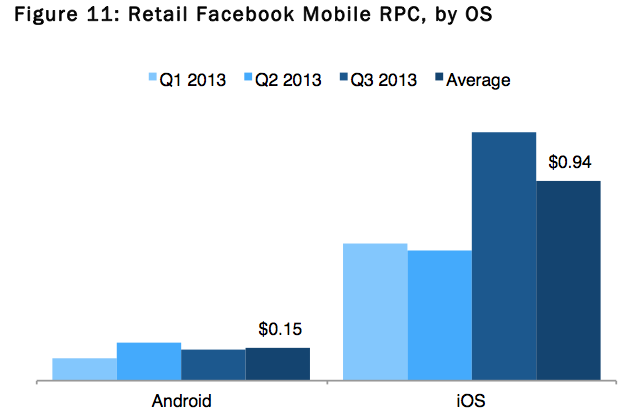Want smarter insights in your inbox? Sign up for our weekly newsletters to get only what matters to enterprise AI, data, and security leaders. Subscribe Now
A study of more than 200 billion ads on Facebook says that mobile ads on iPhone generate 1,790 percent more return on investment than ads on Android. Even worse, advertising on Android actually costs more than it returns.
The study is by Nanigans, one of the biggest buyers of Facebook ads, and it focuses on retailers, saying that in the past year on Facebook’s desktop ads, clickthroughs are up 375 percent and overall return on investment is 152 percent.
But it’s when the report focuses on mobile advertising that the really surprising numbers pop up.
“Retailers are realizing significantly greater return from audiences on iOS than audiences on Android,” the report says. “For the first three quarters of 2013, RPC [revenue per click] on iOS averaged 6.1 times higher than Android and ROI [return on investment] on iOS averaged 17.9 times higher than Android.”
When I talked to Nanigans SVP Dan Slagen about the results, he was candid, telling me that the company was a little “on the fence” about publishing that data, knowing that it would be controversial. Ultimately, however, that’s the data that the company was seeing, and the company decided to let the data speak.
Retailers have a large opportunity on mobile, the company says, but clearly the opportunity is much, much more lucrative on iPhone than it is on Android. Frankly, the numbers are shocking.
It’s not just that Android monetizes worse than iOS — it actually offers negative return on investment. In other words, while advertising on iOS brings retailer 162 percent more cash than they spend on the ads, advertising on Android returns 10 percent less than the cost of the ads.
Nanigans doesn’t speculate why the ad ROI differs so greatly between iOS and Android, and the study doesn’t delve into reasons, simply highlighting what’s happening. Likely, the challenge is the same that Android has faced for years: a lower-end audience.
Brutally put, iPhone owners simply tend to both make more money and spend more money than Android owners.
One caveat that Slagen offered, however, is that the data changes with industry, and that gaming and e-commerce industries, for instance, did not see the same kind of massive iPhone/Android gulf in ROI. Still, customers with iPhones are simply worth more, he said.
“Audiences cost more on iPhone, and the reason is that it’s worth it,” Slagen said. “Typically, we’re not looking to acquire one-time customers, we’re looking to invest over time … so we pay more up front for better long-term results.”
Oddly, however, the costs of advertising on Facebook mobile apps doesn’t really vary between Android and iOS, with CPMs (cost per thousand impressions) of $4.99 for iPhone and just slightly lower, $4.87, for Android. Advertisers are clearly voting with their dollars, however, with advertising budget allocation rising from under 20 percent for iOS in January to well over 50 percent by September.
That’s in spite of Android’s sizable market lead in terms of activations.
It’s only when you get to cost-conscious cost-per-click ad campaigns that you see differentiation: CPC ads on iOS cost $.40, while they are only $.18 on Android. However, with negative ROI, it would appear that Android ads are expensive at any price.







